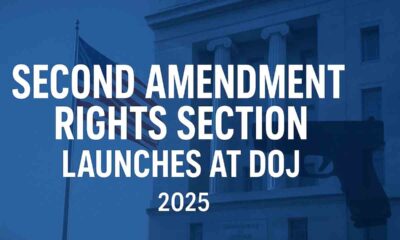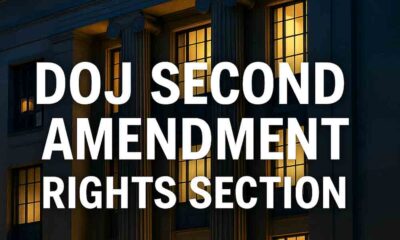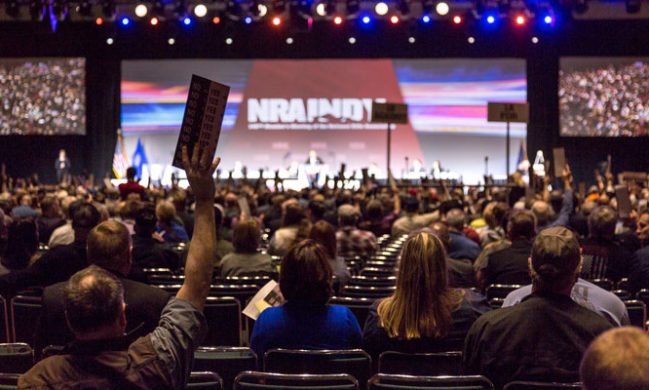Gun Rights
RELOADED! NRA 2.0 Comes Out Swinging in 2025
The nation’s oldest and largest civil-rights organization seemed to be on the ropes just a couple of years ago. Things have clearly changed.
In the aftermath of a series of layoffs during the COVID-19 pandemic and a politically motivated lawsuit courtesy of one Letitia James (hey, Tish, how’s that mortgage?), things were starting to look dire for the NRA. But in 2024, the NRA membership and Board of Directors began making some very big changes. First, the organization elected a new Executive Vice President to replace the scandal-stained Wayne LaPierre. The new EVP, Doug Hamlin, seems to have introduced a new era of candor and financial accountability … and a new era of full-throated defense of the Second Amendment.
What do we mean by that? How about amicus briefs coming out in favor of short-barreled rifles (SBRs), restoring Second Amendment rights to non-violent felons who have served their sentences, and support for full-auto firearms? These are all issues on which the NRA was pretty much silent 10 years ago. It’s sort of thrilling to see. Here are the NRA’s statements describing its position and action on each one of the issues listed above, and here’s where you can donate if you agree!
Wednesday, June 4: NRA Files Amicus Brief in Challenge to Machinegun Possession Ban
Yesterday, the National Rifle Association, Firearms Policy Coalition, and FPC Action Foundation filed an amicus brief arguing that the federal prohibition on machinegun possession is unconstitutional as applied to the defendant in the Fifth Circuit case, United States v. Brown.
Federal law criminalizes the possession by private citizens of any machinegun that was not registered by May 19, 1986. The defendant in the case, Justin Bryce Brown, was convicted of possessing such a firearm.
The district court held the ban unconstitutional as applied to Brown, because the government failed to carry its burden of proving that the law is consistent with the nation’s historical tradition of firearm regulation. As the district court explained, “this is a heavy burden,” and by focusing on policy arguments rather than historical tradition, the government failed to meet it.
Now before the Fifth Circuit Court of Appeals, the NRA filed a brief arguing that the district court’s decision should be affirmed. The brief focuses on the standard the Supreme Court set forth for Second Amendment cases in the NRA’s landmark victory, NYSRPA v. Bruen, and emphasizes that the government must be held to its burden no matter what regulation is at issue.
Friday, June 6: NRA-ILA Petitions the U.S. Supreme Court to Hear Challenge to NFA Restrictions on Short-Barreled Rifles
Today, the National Rifle Association Institute for Legislative Action (NRA-ILA) filed a Petition for Certiorari requesting that the U.S. Supreme Court hear a challenge to the National Firearms Act of 1934’s restrictions on short-barreled rifles in a case named Rush v. United States.
The NFA imposes tax and registration requirements on any rifle having a barrel shorter than 16 inches. A violation is punishable by up to 10 years’ imprisonment and a fine of up to $250,000, in addition to the forfeiture of the rifle. The Petition requests that the Supreme Court hear the case and hold the regulations unconstitutional.
“The National Firearms Act imposes burdens on law-abiding gun owners that have no grounding in the text, history, or tradition of the Second Amendment,” said Doug Hamlin, NRA Executive Vice President & CEO. “The Second Amendment guarantees the right of Americans to own commonly used firearms—including short-barreled rifles—without government interference, and we’re hopeful that the Supreme Court will use this opportunity to reaffirm that right.”
The Petition emphasizes the confusion among the lower courts over how to adjudicate restrictions on specific categories of arms—including not only short-barreled rifles, but also AR-style rifles and standard-capacity magazines—and the need for the Court to add clarification and reinforce its precedents. As the Petition points out, “the uncertainty throughout the lower courts undermines the Court’s precedents, diminishes the Second Amendment, and deprives citizens of their ability to vindicate their constitutional rights.”
The Petition proceeds to explain why the NFA’s restrictions on short-barreled rifles violate the Second Amendment under the Supreme Court’s test. Put simply, short-barreled rifles are “arms” covered by the Second Amendment’s plain text, and there is no historical tradition of regulation that supports the registration and taxation of common arms.
“The NFA’s restrictions on short-barreled rifles have unconstitutionally burdened law-abiding gun owners for far too long,” said John Commerford, NRA-ILA Executive Director. “The NRA is proud to stand at the forefront of this fight to restore our freedoms and ensure that peaceable citizens are not treated like criminals for owning commonly used firearms.”
Wednesday, June 11: NRA Files Amicus Brief Urging SCOTUS to Hear Challenge to Ban on Firearms Possession by Nonviolent Felons
Today, the National Rifle Association, along with the Second Amendment Foundation, Firearms Policy Coalition, and FPC Action Foundation, filed an amicus brief urging the U.S. Supreme Court to hear a challenge to the federal lifetime prohibition on firearms possession by nonviolent felons.
The case, Vincent v. Bondi, was brought by Melynda Vincent, who was convicted of a felony in 2008 for submitting a fraudulent check to a grocery store in the amount of $498.12. As a result, she is forever prohibited from possessing a firearm under 18 U.S.C. § 922(g)(1).
Since her conviction, Ms. Vincent has earned two graduate degrees, founded a nonprofit, and become an adjunct professor. She challenged the federal lifetime ban as a violation of her Second Amendment rights, but the Tenth Circuit ruled that no one can challenge the federal law, regardless of what the felony was for or how long ago it occurred. Ms. Vincent then petitioned the Supreme Court to hear the case, and we filed a brief urging the Court to grant the petition.
Our brief provides a detailed historical analysis demonstrating that peaceable citizens—including nonviolent felons—were never disarmed throughout American history. From the earliest colonial days through the nineteenth century, the government disarmed only dangerous persons. Therefore, the government cannot prove that § 922(g)(1) is consistent with the nation’s historical tradition of firearm regulation, as the Supreme Court requires, and the law is unconstitutional.
-

 Action Alerts1 month ago
Action Alerts1 month agoNFA Unconstitutional: Jensen v. ATF Ends 91-Year Gun Tax
-

 Action Alerts2 months ago
Action Alerts2 months agoGovernment Shutdown Firearm Imports: 2025 Crisis
-

 Breaking News3 weeks ago
Breaking News3 weeks agoSecond Amendment Rights Section Launches at DOJ
-

 Gun Rights2 months ago
Gun Rights2 months agoNew 2025 Gun-Law Roundup: NY, FL, DE, CA + SCOTUS Hemani
-

 Gun Rights2 months ago
Gun Rights2 months ago2A Rights 2025: Elections Reshape Gun Laws in America
-

 Laws & Rights1 month ago
Laws & Rights1 month agoEpstein Files Second Amendment: 2025 Release Insights
-

 Breaking News2 weeks ago
Breaking News2 weeks agoDOJ Second Amendment Rights Section: What It Means







